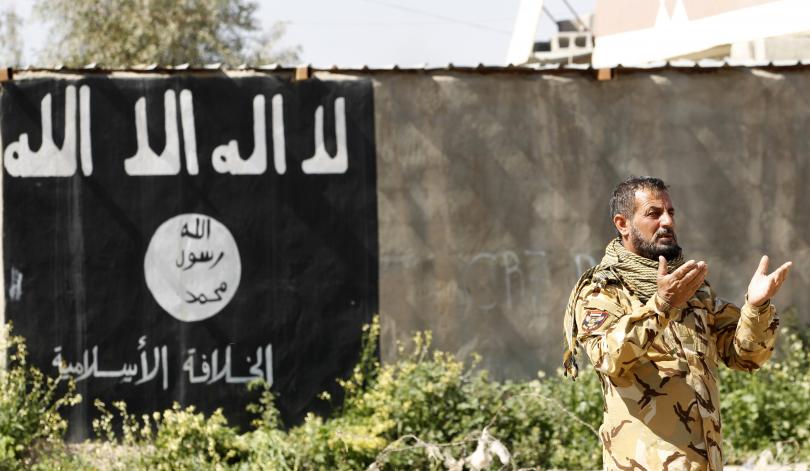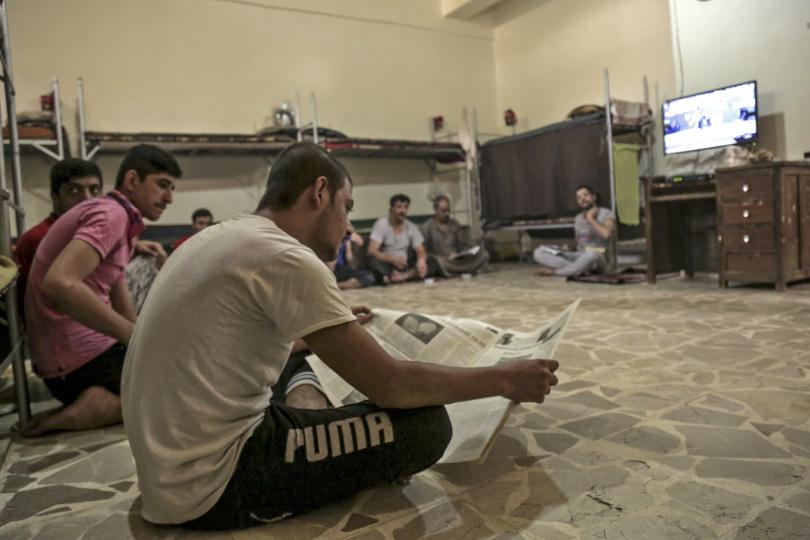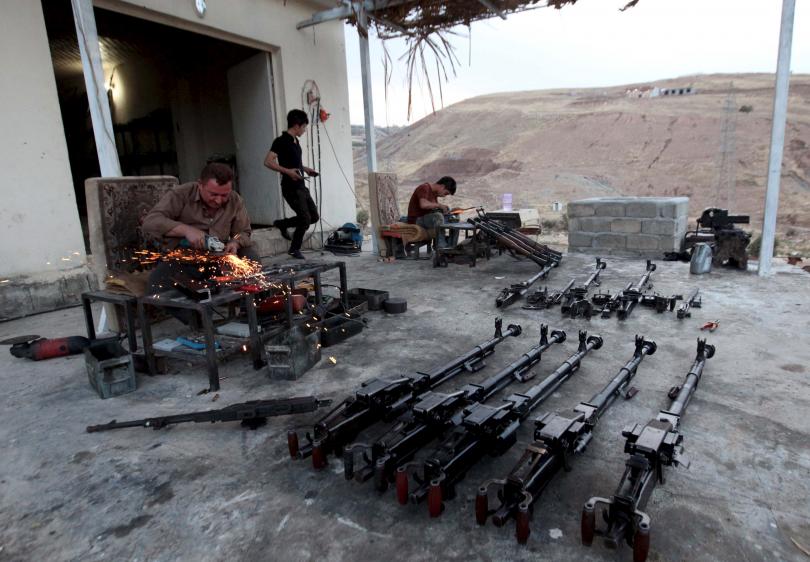Why We Joined ISIS: To Make Friends and Earn a Good Wage
SPECIAL FEATURE, 8 Feb 2016
Erin Banco – International Business Times
29 Jan 2016 — On the spring day two years ago that Mohammed Abdul Kareem, 28, met a recruiter for the Islamic State group in Haditha, in Iraq’s western Anbar province, his hometown was much the same as it had always been: The main market bustled; women and children traipsed in and out of shops along the main drag, picking up fresh bread, meat and vegetables for the evening meal; policemen stood in the middle of busy intersections, lazily waving traffic through. People were content, Kareem said in an exclusive interview with International Business Times.
But an obscure militant group then known as the Islamic State of Iraq and al-Sham (ISIS) was gaining traction among disenfranchised young men in poor, rural neighborhoods. An underground movement, one that grew by offering regular pay and multiple wives for its members, would eventually turn Haditha into an epicenter of terrorist recruitment.

A member of a group of militias known as Hashid Shaabi prays as he celebrates victory next to a wall painted with the black flag commonly used by ISIS militants, in the town of al-Alam, Iraq, March 10, 2015. Photo: Reuters/Thaier Al-Sudani
All his adult life, Kareem had tried, and failed, to find steady work in Haditha. In the early hours of the morning, he wandered the streets looking for a construction worker who might want to hire a casual laborer for the day. If he was lucky, he might earn $10, but more often than not he returned home empty-handed. As soon as darkness fell, in the absence of electricity, he went to sleep. At night, he dreamed he was a child again, playing with his neighbors’ children in the streets after class.
Those days were long behind him, no more so than now, languishing in a Kirkuk prison, slumped in a steel chair, his wrists bound. Kareem said he didn’t know much about Abu Aya, the enigmatic ISIS recruiter who first appeared in Haditha in 2014. He was inscrutable: walking alone and never engaging in public confrontations. But for Kareem, this quietly religious man offered him a way out of the poverty and despair that had come to characterize his life.
“I went to school, but my family couldn’t pay for [my food], so I quit school to be able to work to help them,” Kareem said, a solitary tear making its way down his right cheek. “I wanted to do anything else other than being a [casual] labor worker. I was very tired of that job.”
Kareem is one of the thousands of young Iraqi men to have joined ISIS in 2014. He joined a movement of people desperate for a way out of their dire financial straits. In the fall of 2014, the CIA estimated that as many as 31,500 people were members of the Sunni militant group — from Tunisia to Egypt, from Syria to France, from Afghanistan to Indonesia. While experts say some members of the group join because they believe in its extremist ideology, many sign up because they are young, uneducated, poor and vulnerable, not dissimilar to gang members in cities across the United States.
Those recruits, like Kareem, were targeted by ISIS leaders in a recruitment cycle that focused on expanding rapidly, Mia Bloom, an expert on terrorism at Georgia State University, said. The majority of local fighters came from countries like Iraq and Syria because “for them, it’s an economic decision, a decision of life or death,” she said.
“ISIS went through stages where they needed [more] people [quickly], so they took anyone. The barriers to entry were very low. Then, once they established the caliphate, they started going after doctors and engineers. It’s not linear. We see this in cycles,” Bloom said. “With ISIS, we see a different kind of terrorist that looks more like the Taliban in terms of education and credibility.”

Prisoners watch television as one of them reads a newspaper inside Derick central prison, east of Syrian Kurdish city of Qamishli, Syria, Sept. 10, 2015. Photo: Reuters/Rodi Said
Bloom said while the masterminds behind 9/11 and other major terrorist attacks across the world were predominantly wealthy and well-educated, they were targeted recruits.
“The recruitment package and pitch looks very different for foreign ISIS fighters than it does for your average young guy in Iraq and Syria,” Bloom told IBT. “For them it is about getting a paycheck and a wife. For the foreign fighters, they are given pitches about things like Donald Trump and the Kufar [infidels].”
For Naif Shahab Ahmad, 22, joining ISIS meant finally being able to pay for the clothes and food his mother, father and uncle needed. They lived in a small village on a main road just outside Kirkuk.
“They told me: ‘If you join, we will pay you a monthly allowance.’ So, I joined them,” Ahmad said from the prison cell he shares with Kareem. “If you are talking about reasons for joining, there is a financial aim, or an aim for gaining a position. And there are people who believe their ideology completely, so they join. I’m one of those who needed money.” Ahmad made 150,000 Iraqi dinar ($136) per month with ISIS — four times higher than the average Iraqi citizen. According to the World Bank, an Iraqi living in rural regions typically makes about $36 a month.
For Kareem’s part, he didn’t just want money; he wanted friends and a sense of belonging, he told IBT. He was lonely and the promise of friends and a potential mate was enough to ensnare him. Through ISIS, he could be part of something much bigger than himself. He noticed ISIS recruiter Abu Aya going in and out of nearby houses, visiting the homes of young men his age. He had heard about Aya from his neighbors.
“Abu Aya asked me: ‘Why haven’t you joined ISIS yet?’ I told him I don’t know anyone here or in Kirkuk to show me how. Then he told me, ‘Don’t worry, I will help you.’ ”
A few days later, Kareem received a call from a man in a prison controlled by the Kurdistan Regional Government (KRG) in Iraqi Kurdistan. He arranged for Kareem to travel to a desert area west of Haditha to meet with another recruiter. At the designated meeting spot, Kareem was blindfolded and pushed into a car. The recruiter drove four hours to Haseyba, a town on the Syrian border.
Once there Kareem was forced to recite a pledge to ISIS before taking part in a two-week training program for new recruits.
“[The pledge] was something like, ‘I pledge loyalty to Abu Bakr al-Baghdadi [the ISIS leader]. I don’t really remember,” he said, under the watchful gaze of the security guards.

A Kurdish man repairs weapons for Peshmerga forces fighting against ISIS militants, in his shop outside of Irbil, Iraq, Sept. 15, 2015. Photo: Reuters/Azad Lashkari
In the training program, Kareem said he learned how to fight, how to shoot and how to operate different weapons. He fasted for three days while completing a series of rigorous physical fitness tests. When their physical endurance wasn’t being tested, their spiritual stamina was: Every morning and evening, the recruits studied the Quran, something Kareem initially struggled with.
“I am not very devoted,” he said. “I pray, but not regularly.”
Kareem learned the mission of the group during training camp and abided by it, even though he says he didn’t agree with it.
“The reason I joined them is because I didn’t have any source of living. I wanted to escape my job as a [construction] worker,” Kareem said. “But when I joined them, it was difficult to leave and betray them.”
After the training program, ISIS allowed the new recruits to return home to their families for three weeks of leave. During that time, the group took over three major Sunni Muslim cities: Mosul, Baiji and Tikrit. The militants were advancing on Iraq’s capital, Baghdad, and needed all hands on deck. They reached out to Kareem’s recruitment class after plotting to take over Ramadi and Fallujah, the predominantly Sunni Muslim cities in Anbar province. ISIS ordered the unit to return to their training camp and wait for instructions.
But all roads leading from Kirkuk were closed, controlled by the Peshmerga, the military force in Iraqi Kurdistan. During this time, Kareem attempted to smuggle himself out of the area to get back to training camp. He was relying on his new position in the group for money. It was at this point he met Ahmad, his future cell mate and fellow ISIS member. They connected through a group of smugglers who were setting up routes to ferry people into ISIS territory.
“I got to know him. I asked him if the road is open and he said he didn’t know,” Kareem said of Ahmad. “After a couple of days, he called me and told me the road was open. He had arranged a car with smugglers to escape.”
The smugglers dropped Ahmad and Kareem off in an unknown location in the desert from where they would have to walk to the training camp. On the road, walking in the dark, they ran into a group of men, Iraqi security officers.
“When they saw us, they arrested us right away,” Kareem said.
Since December 2014, Kareem and Ahmad have been locked up together, transferred from interrogation sites, to small military prisons, to large municipal jails. They never earned the salary promised to them, and now, they say, they have no future. Too poor to afford a lawyer, they have no trial date and must contend with indefinite detention.
Both men denounced ISIS, but security officers and a guard were present throughout their interviews with IBT, so they were unlikely to speak in favor of the Sunni militant group.
“[ISIS] targets those who are not educated and don’t have work. That’s what I understood from them,” Kareem said.
His clothes, and those of Ahmad, were torn and tattered, the same garments they’d been wearing when they were detained one and a half years earlier. Incarceration had not been kind to them: unwashed and exhausted, the two men had heavy bags under their eyes and facial bruising.
When they did denounce ISIS, their words sounded rehearsed.
“This is advice from the bottom of my heart, I don’t want anyone to join them. They are like snakes,” Kareem said. “Thank God, I didn’t kill anyone. My advice [to] everyone, especially young people [is] don’t get close to them. Do any other job, but don’t get close to them.”
Whatever their private views, both prisoners are paying a public price.

An explosion rocks Syrian city of Kobani during a reported suicide car bomb attack by ISIS militants on a People’s Protection Units position in the city center, as seen from the outskirts of Suruc, Turkey, Oct. 20, 2014. Photo: Gokhan Sahin/Getty Images
DISCLAIMER: The statements, views and opinions expressed in pieces republished here are solely those of the authors and do not necessarily represent those of TMS. In accordance with title 17 U.S.C. section 107, this material is distributed without profit to those who have expressed a prior interest in receiving the included information for research and educational purposes. TMS has no affiliation whatsoever with the originator of this article nor is TMS endorsed or sponsored by the originator. “GO TO ORIGINAL” links are provided as a convenience to our readers and allow for verification of authenticity. However, as originating pages are often updated by their originating host sites, the versions posted may not match the versions our readers view when clicking the “GO TO ORIGINAL” links. This site contains copyrighted material the use of which has not always been specifically authorized by the copyright owner. We are making such material available in our efforts to advance understanding of environmental, political, human rights, economic, democracy, scientific, and social justice issues, etc. We believe this constitutes a ‘fair use’ of any such copyrighted material as provided for in section 107 of the US Copyright Law. In accordance with Title 17 U.S.C. Section 107, the material on this site is distributed without profit to those who have expressed a prior interest in receiving the included information for research and educational purposes. For more information go to: http://www.law.cornell.edu/uscode/17/107.shtml. If you wish to use copyrighted material from this site for purposes of your own that go beyond ‘fair use’, you must obtain permission from the copyright owner.